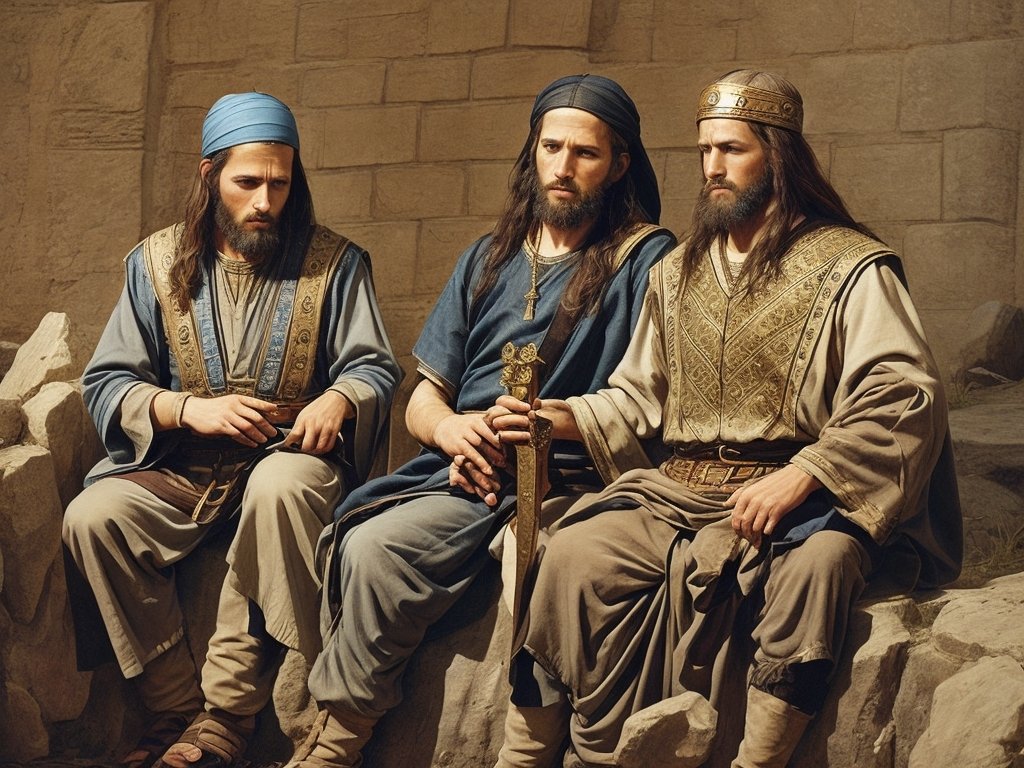
Who were sons of David and what happened to them?
The Sons of David: We Know Solomon, But Who Were David’s Other Sons?
فرست محتوا
How many sons did David have?
According to the First Book of Chronicles, David had at least 19 sons from at least seven different women. This section divides the list of sons of David based on two factors: their birth period and their mothers.
Several of sons of David were born between Saul‘s death (when David ruled a part of Israel called Hebron) and his victory over Ish-bosheth, Saul’s son (which made David the undisputed king of Israel). The sons born during this period include:
- Amnon
- Daniel
- Absalom
- Adonijah
- Shephatiah
- Ithream
After David became the undisputed king of Israel, more sons were born:
- Shimea
- Shobab
- Nathan
- Solomon
- Ibhar
- Elishua
- Nepheg
- Japhia
- Elishama
- Eliada
- Eliphelet
As we will discuss in later sections, the First Book of Chronicles does not tell us everything we would like to know. It lists the total number of David’s legitimate sons – 19 – but ends with the phrase, “All these were the sons of David, besides the sons of the concubines” (1 Chronicles 3:9). Therefore, David had more sons whose names are not recorded because they were not part of the succession line.
Read more: Who is Jacob in the Bible and why did he wrestle with God?
How many sons did each of David’s wives have?(sons of David)
David had many wives. His first wife, Michal, the daughter of Saul, had no children (2 Samuel 6:23). Whether David sinned by having so many wives is a topic we will address later. For now, let’s see who these wives were and how many of sons of David each gave birth to.
- Ahinoam of Jezreel: Mother of Amnon. Easton’s Bible Dictionary explains that Jezreel was an Israelite city in the territory of the tribe of Issachar.
- Abigail of Carmel: Mother of Daniel. As detailed in 1 Samuel 25, Abigail was initially married to a foolish man named Nabal who insulted David and almost got himself killed for his insolence. Abigail convinced David not to kill her husband, though Nabal later died of a stroke or heart attack after realizing how close he had come to death.
- Maacah, daughter of Talmai, king of Geshur: Mother of Absalom. The International Standard Bible Encyclopedia notes that Geshur was an Aramean kingdom, which might explain why David did not face trouble for breaking the law that forbade marrying foreigners (Deuteronomy 7:2-5). The Arameans, like the Israelites, were descended from Noah’s son Shem (Genesis 10:21-22). They were foreigners but Semitic, not one of the seven nations the Israelites were supposed to destroy (Deuteronomy 7:1). Maacah also had at least one daughter, the only daughter of David mentioned in the Bible: Tamar (2 Samuel 13:1).
- Haggith: Mother of Adonijah.
- Abital: Mother of Shephatiah.
- Eglah: Mother of Ithream.
- Bathsheba: Gave birth to at least four of sons of David: Shimea, Shobab, Nathan, and Solomon.
Since 1 Chronicles 3 omits illegitimate sons (sons of concubines), this list likely excludes the first son Bathsheba had with David. 2 Samuel 11 explains how David, after learning that Bathsheba was pregnant, arranged for her husband to be killed and quickly married her. The prophet Nathan informed David that God was angry with his sins and the son would die shortly after birth. The passage does not name the first son, only stating that Solomon was born shortly afterward. Therefore, Bathsheba may have had a total of five sons with David.
Did David sleep with Saul’s wives?
1 Chronicles 3 does not mention the mothers of Ibhar, Elishua, Eliphelet, Nogah, Nepheg, Japhia, Elishama, Eliada, and Eliphelet. Since these sons are categorized as “sons of David, besides the sons of the concubines” (1 Chronicles 3:9), it is clear that they were legitimate. So why are their mothers not named?
These women were likely previously married to someone else. When Nathan the prophet rebuked David for his adultery with Bathsheba, he reminded him that God “gave your master’s house to you, and your master’s wives into your arms” (2 Samuel 12:8). The master referred to Saul, the first king of Israel. Saul had at least one wife named Ahinoam (1 Samuel 14:50) and at least one concubine named Rizpah (2 Samuel 3:7). The Bible does not mention any other wives or concubines of Saul, though it lists eight of his children (1 Chronicles 8:33, 1 Samuel 14:49, 2 Samuel 2:28). Thus, it is likely that Saul had multiple wives and concubines.
David taking Saul’s wives was a common practice at the time. Ancient Near Eastern cultures gave women few rights (or none at all). Warriors often seized the women of men who had been killed or defeated. For example, after Saul’s death, Abner, his army commander, took Rizpah (2 Samuel 3:7). As we will see in the discussion about Absalom, this later backfired on David.
It is unclear whether David had relations with all of Saul’s wives. God’s law prohibited marrying a woman and her mother (Leviticus 20:14), and David’s first wife, Michal, was Saul’s daughter. Therefore, he likely did not marry Michal’s mother if she was still alive. Since David’s culture treated women like property and someone had to care for the widows, he likely returned Michal’s mother to her family or kept her in the palace to please Michal.
While ancient Near Eastern cultures may have allowed warriors to take other men’s wives, this did not necessarily mean those women were valued. The concept of “honor” (and disgrace) was significant, and Saul was not an honorable king. He lost his kingship for disobeying God (1 Samuel 15:22-23). This might explain why 1 Chronicles 3 starts Israel’s royal genealogy with David and then devotes five chapters later to Saul’s genealogy.
Therefore, even after Saul’s death, his wives likely held low social status. David may have married them, making his sons legitimate, but their culture probably saw them as “tainted goods.” Hence, it would not be surprising if the authors of 1 Chronicles 3 omitted their names while mentioning their sons.

Who were sons of David?
The Bible does not provide precise details on the fate of all of sons of David. However, a few sons appear in later biblical stories.
- Amnon: He developed feelings for his half-sister Tamar. While God seemed lenient towards earlier sibling marriages (like Abraham and Sarah), He explicitly forbade sexual relations between siblings or half-siblings in Leviticus 20:17. Amnon not only intended to break this law but also appeared driven by lust. He became sick with lust (2 Samuel 13:2), devised a plan to sleep with Tamar, and did not care about her consent (2 Samuel 13:5-14). Later, he hated her and threw her out of his room (2 Samuel 13:15).
- Absalom: Tamar’s brother, learned of Amnon’s rape of Tamar shortly after it happened (2 Samuel 13:20-22). He arranged for Amnon’s murder (2 Samuel 13:23-29). Years later, he plotted against David (2 Samuel 16). After David fled Jerusalem, Absalom slept with some of David’s concubines (2 Samuel 16:15-22). This act, like David’s taking Saul’s wives, was a power move: declaring that he was taking his father’s place. Absalom’s coup failed, and Joab, David’s commander, disobeyed David’s orders and killed Absalom (2 Samuel 18).
- Adonijah: Did not join Absalom’s rebellion but later orchestrated a subtler conspiracy. As David grew old and Israel anticipated his death, Joab collaborated with Abiathar the high priest to place Adonijah on the throne (1 Kings 1:5-52). Bathsheba alerted David to what was happening, and he quickly named Solomon as his heir. Adonijah begged for mercy, but Solomon executed him years later. Adonijah had requested to marry Abishag the Shunammite, who had cared for David and slept in his bed due to his old age. Solomon interpreted this as Adonijah’s attempt to claim one of David’s “wives,” challenging Solomon’s authority.
- Solomon: One of David’s most famous sons, Solomon became king despite being one of the younger sons. After becoming king, he asked God for wisdom and gained both wisdom and wealth (1 Kings 3:13). Solomon dedicated his reign to fulfilling his father’s dream of building a temple for God (1 Kings 6), and his era is often considered Israel’s golden age. Unfortunately, Solomon also took many wives – 700 wives and 300 concubines (1 Kings 11:3). God punished him for marrying many foreign women who introduced idol worship to Israel (1 Kings 11:9-13). As a result, Solomon’s son, Rehoboam, faced a rebellion that split Israel (1 Kings 12).
- Nathan: Appears in the Gospel of Luke’s genealogy of Jesus (Luke 3:31), suggesting his descendants survived into the Roman Empire era.
What happened to David’s other sons?
The Bible tells us little about David’s other sons. Some sons may have died early. In some cases, the Bible does not mention their names, as with David’s first son with Bathsheba. This first son died shortly after birth, in accordance with God’s prophecy (2 Samuel 12:14-23).
Other sons may have held public office. The Bible refers to sons of David Shammua, Shobab, Nathan, Solomon, Ibhar, Elishua, Nepheg, Japhia, Elishama, Eliada, and Eliphelet without providing many details about their lives (2 Samuel 5:14-16). Some of them likely held minor public positions that have not been recorded. We also know that David appointed his son Azariah as a priest (1 Chronicles 24:5-6), though it is unclear whether Azariah was legitimate or an adopted son.
In conclusion, the Bible provides a clear picture of some of sons of David but leaves others shrouded in mystery. While some played significant roles in biblical history, others remain obscure, known only by their names and lineage.






